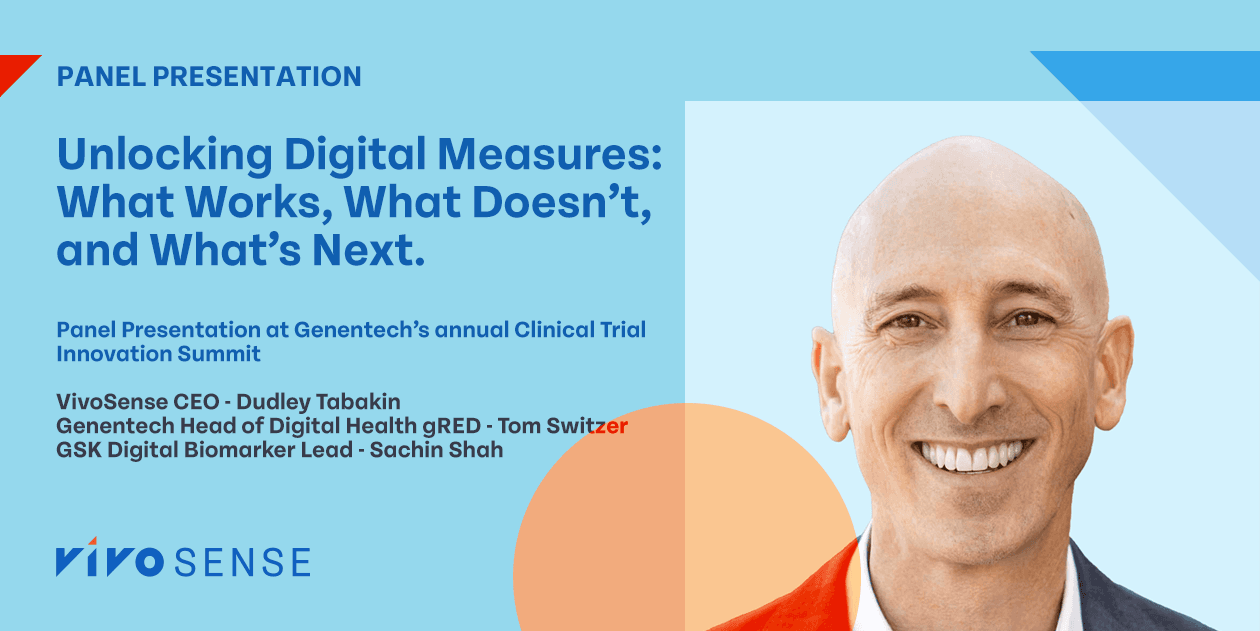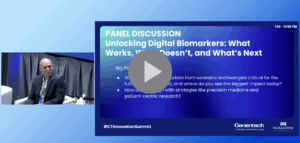Unlocking Digital Biomarkers: Insights from Genentech’s Clinical Trial Innovation Summit
Recently, VivoSense CEO and co-founder, Dudley Tabakin, led an engaging panel at Genentech’s annual Clinical Trial Innovation Summit, titled Unlocking Digital Biomarkers: What Works, What Doesn’t, and What’s Next.
Joining Dudley on the panel were Dr. Sachin Shah, Digital Biomarker Lead at GSK, and Tom Switzer, Head of Digital Health at gRED, Genentech. Together, they shared real-world experiences from the front lines of digital biomarker implementation.
As the industry continues to embrace wearable sensors and digital health technologies, the panel addressed a central challenge: how to move from the promise of digital endpoints to practical, scalable implementation.
A New Model for Digital Biomarker Success
Dudley introduced the Wearable Sensor CRO model, a novel operational framework developed by VivoSense to support study teams navigating the complexities of digital biomarker integration. Unlike traditional CROs, this model offers specialized scientific and operational expertise tailored to wearable sensor data, helping pharma teams reduce burden, accelerate timelines, and maintain scientific rigor.
“We’re seeing a shift in how sponsors approach digital endpoints,” Dudley noted. “The Wearable Sensor CRO model is designed to meet teams where they are, whether they’re just starting out or scaling across global trials.”
He emphasized the importance of balancing innovation with discipline, highlighting common pitfalls such as:
- – underestimating data variability
- – overcomplicating device selection
- – and overlooking patient-centric design.
The model helps mitigate these risks by offering end-to-end support, from protocol design to data interpretation, while empowering sponsors to retain strategic oversight.
Operational Realities and Strategic Alignment
Dr. Shah spoke to the operational demands of managing wearable sensor data at scale, including the need for robust internal capabilities in data science, clinical operations, and regulatory strategy that showcase rigor within patient-centric Meaningful Aspect of Health work. He highlighted GSK’s approach to evaluating digital biomarkers for regulatory submission and the importance of cross-functional collaboration.
Tom Switzer offered a strategic lens, discussing how Genentech prioritizes digital biomarkers within its precision medicine framework. He addressed the resource-intensive nature of implementation, especially in early-phase trials, and the infrastructure gaps that can slow adoption.
“Digital measures are not just a technology challenge; they’re a systems challenge,” Tom explained. “Success requires alignment across teams, clear value propositions, and a willingness to iterate.”
What’s Working, What’s Next
The panel explored what’s working well in the field, from improved patient engagement to more nuanced endpoint development, and where persistent challenges remain. Topics included:
- – Regulatory alignment and validation pathways
- – Device interoperability and data standardization
- – Patient adherence and real-world usability
- – The need for scalable infrastructure and flexible trial designs
In a series of cross-panel questions, the speakers reflected on underutilized measures, misconceptions in the field, and what they would change about the industry’s approach to digital endpoints.
Looking Ahead
The panel concluded with clear consensus: the future of digital biomarkers lies in strategic partnerships, operational innovation, and patient-centered design. But realizing that the future will require more than just promising technologies, it demands new models of partnership and execution.
At VivoSense, we believe the Wearable Sensor CRO model is a critical enabler of this transformation. By combining deep scientific expertise with operational agility, this model helps study teams overcome the most persistent barriers to adopting digital measures. From device integration and data variability to regulatory alignment and patient engagement.
“We’re not just supporting trials, we’re co-creating solutions with sponsors,” said Dudley. “Our model is built to flex with the needs of each study, while maintaining the rigor and reliability that regulators and patients expect.”
As digital endpoints become more central to clinical research, sponsors will need partners who understand both the science and the systems. The Wearable Sensor CRO model offers a scalable, adaptable framework that empowers pharma teams to innovate confidently, without compromising quality or timelines.
Looking ahead, the path to progress will be paved by:
- – Cross-sector collaboration between pharma, tech, and academia
- – Infrastructure investment to support scalable digital endpoint operations
- – Patient-first design that ensures usability and adherence
- – And new operational models, like the Wearable Sensor CRO, that bridge the gap between innovation and execution
VivoSense is proud to be at the forefront of this movement, helping sponsors turn digital biomarker potential into measurable impact.
Watch the Panel Presentation Here
